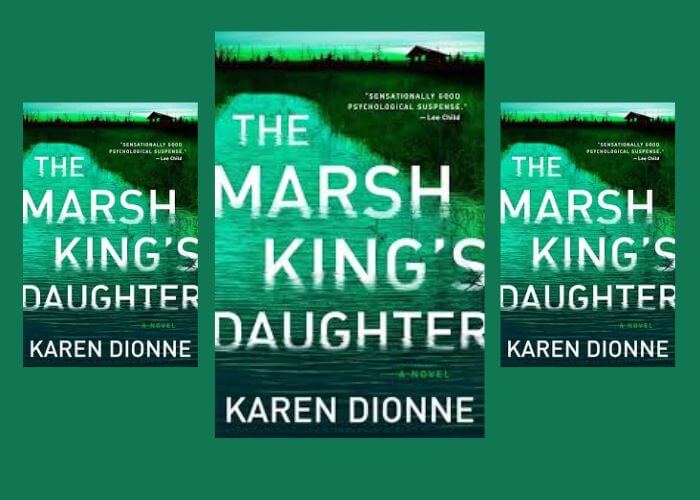Blog
The Marsh King’s Daughter: Karen Dionne Thriller Review

Hook and Opening
What happens when the person who threatens to steal her future is the same man who shaped her past? This haunting question drives Karen Dionne’s compelling psychological thriller, “The Marsh King’s Daughter“. As readers dive into this mesmerizing tale of a woman caught between her dark past and uncertain future, they discover a story that challenges everything they thought they knew about family, survival, and identity.
This internationally bestselling novel has garnered critical acclaim and is now a major motion picture starring Daisy Ridley and Ben Mendelsohn. The book stands as a powerful testament to resilience, making it one of the best books in contemporary psychological suspense.
Book Overview and Plot Summary
“The Marsh King’s Daughter by Karen Dionne” falls squarely into the psychological thriller genre, with compelling elements of coming-of-age and wilderness survival. The story is told through the eyes of Helena Pelletier, a woman who must risk everything when her father escapes from prison.
The basic premise centers on Helena’s complex past. As a child born in captivity, she spent her formative years living in the wild marshlands of Michigan’s upper peninsula. Helena and her mother were held captive by Helena’s father, known as the Marsh King, in what the world calls the marsh – a remote, unforgiving wilderness.
Twenty years later, Helena has a secret. She’s built a new life with a loving husband and two beautiful daughters, far from the marshlands where she grew up. However, when her father, now armed and dangerous, breaks out of maximum security prison, Helena must confront her past and embark on a manhunt to protect her family.
The book takes place across two timelines, weaving between Helena’s past in the wilderness and her present-day hunt for her father. This dual narrative structure creates mounting tension as readers understand both the relationship with her father and the stakes of his escape.
Character Analysis
Helena as Protagonist
Helena Pelletier serves as a fascinating and complex protagonist. Pelletier has a loving husband and appears to live an ordinary suburban life, yet beneath this facade lies a woman shaped by extraordinary circumstances. Her character development from victim to potential hunter showcases the internal conflict between her civilized present and the wilderness skills learned during her captivity.
Helena’s journey demonstrates the lasting impact of trauma. The relationship with her father remains complicated – he was both protector and captor during her childhood in the marsh. This psychological complexity drives much of the novel’s tension, as Helena must reconcile her feelings for her mother and the conflicting emotions toward her father.
The Father/Marsh King
The titular Marsh King emerges as a multifaceted antagonist. His role as both protector and captor in Helena’s memories creates a villain whose motivations readers can understand, even if they cannot condone his actions. The sometimes brutal behavior contrasts with moments of genuine care, making him a compelling and disturbing figure.
Supporting Characters
Helena and her husband represent the normal life she’s built, while Iris and Mari – her two beautiful daughters – symbolize everything she has to lose. These characters ground the story in present-day reality, showing what Helena must protect from her dangerous past.
Themes and Literary Elements
Survival and Resilience
The novel explores both physical and psychological survival. Growing up in the marsh taught Helena skills that serve her well in her adult hunt down the dangerous man who once controlled her life. The life on the marsh scenes demonstrate how harsh environments can forge resilient individuals.
Nature vs. Nurture
Living in the wild shaped Helena’s identity in profound ways. The marshlands serve as more than just a setting – they become a character in their own right, influencing every aspect of Helena’s development and current predicament.
Trauma and Healing
The long-term effects of childhood abuse permeate the narrative. Helena’s struggle to maintain her normal life while dealing with her traumatic past creates compelling internal conflict that drives the story forward.
Fairytale Retelling
The connection to Hans Christian Andersen fairy tale adds layers of meaning to the story. The “Marsh King’s Daughter” draws inspiration from the classic tale, reimagining it for contemporary audiences while maintaining the dark undertones of the original.
Stockholm Syndrome and Complex Emotions
The complicated emotions toward an abuser form a central theme. Helena’s conflicted feelings about her father demonstrate how victims can develop complex relationships with their captors, especially when that captor is also a parent.
Writing Style and Craft
Narrative Structure
The dual timeline structure proves highly effective, with past and present narratives complementing each other perfectly. This approach allows readers to understand Helena’s capabilities while building tension about her current situation.
Atmospheric Writing
Dionne’s ability to bring the marsh setting to life stands out as one of the book’s greatest strengths. The marshlands become atmospheric and almost mystical, serving as both beautiful and threatening backdrop to the story.
Pacing and Suspense
The balance between action and psychological depth keeps readers engaged throughout. The pacing builds steadily toward the inevitable confrontation between father and daughter, maintaining suspense despite some predictable elements.
Critical Analysis – Strengths
Compelling Premise
The unique twist on the captivity narrative sets this book apart from other thrillers. The idea of a daughter hunting her escaped father creates immediate tension and emotional complexity.
Strong Sense of Place
The marsh setting serves as a vivid, almost mystical location that becomes integral to the story. Dionne’s detailed knowledge of wilderness survival adds authenticity to the narrative.
Psychological Complexity
The nuanced exploration of trauma and family dynamics elevates this beyond a simple thriller. The psychological suspense elements create lasting impact beyond the immediate plot.
Wilderness Expertise
The authentic outdoor survival elements demonstrate Dionne’s research and expertise. The manhunt scenes feel genuine and grounded in real wilderness knowledge.
Critical Analysis – Weaknesses
Pacing Issues
Some sections, particularly early exposition, move slowly compared to the action-packed finale. The transition between past and present occasionally feels abrupt.
Character Development
While Helena is well-developed, some supporting characters feel underdeveloped. Helena and her husband’s relationship could have been explored more deeply to enhance emotional stakes.
Plot Conveniences
Certain moments strain credibility, particularly some of the coincidences that drive the manhunt forward. The resolution, while satisfying, relies on some convenient circumstances.
Comparison and Context
Similar Books
“The Marsh King’s Daughter” shares DNA with other psychological thrillers like Emma Donoghue’s “Room” and Gillian Flynn’s “Sharp Objects.” However, Dionne’s wilderness setting and fairytale connections create a unique niche.
Fairytale Retellings
The book fits well within the genre of modern fairytale adaptations, joining works that reimagine classic tales for contemporary audiences while maintaining their dark psychological elements.
Wilderness Thrillers
Among wilderness thrillers, Dionne’s work stands out for its psychological depth and the unique perspective of a female protagonist in a traditionally male-dominated genre.
Cultural and Social Impact
Representation of Trauma
The book handles sensitive subject matter with care, avoiding exploitation while honestly depicting the long-term effects of childhood abuse and captivity.
Gender Dynamics
Helena’s role as a female protagonist in wilderness survival fiction challenges genre conventions, presenting a woman as both victim and hunter.
Film Adaptation
The upcoming film adaptation will likely bring new attention to the story, with Daisy Ridley and Ben Mendelsohn’s casting generating significant interest.
Target Audience and Recommendations
Ideal Readers
Fans of psychological thrillers, wilderness fiction, and complex family dramas will find much to appreciate. Book club discussions could explore the novel’s themes of trauma, family, and survival.
Content Warnings
Readers should be aware of themes involving kidnapping, abuse, and violence. The book deals with mature themes that may be triggering for some readers.
Age Appropriateness
This is definitely adult fiction due to its mature themes and psychological complexity.
Personal Reflection and Final Assessment
Emotional Impact
“The Marsh King’s Daughter” leaves readers with lingering questions about family, loyalty, and survival. The psychological elements create lasting impressions that extend beyond the immediate thriller plot.
Discussion Potential
The book offers rich material for book club discussions, particularly around themes of trauma, family dynamics, and moral ambiguity.
Re-readability
Knowing the outcome doesn’t diminish the book’s impact, as the psychological complexity and atmospheric writing reward multiple readings.
Conclusion and Rating
“The Marsh King’s Daughter by Karen Dionne” succeeds as both a compelling thriller and a thoughtful exploration of trauma and identity. Despite some pacing issues and plot conveniences, the book’s strengths far outweigh its weaknesses.
The unique premise, atmospheric setting, and complex characterization make this a standout entry in contemporary psychological suspense. Readers looking for thrillers with depth and emotional resonance will find this an excellent choice.
The upcoming film adaptation promises to bring new audiences to this powerful story, and both new and returning readers will find plenty to discuss and analyze.
Rating: 4/5 stars
For those seeking a psychological thriller that combines wilderness survival with family drama, “The Marsh King’s Daughter” delivers a memorable and impactful reading experience. Don’t miss the chance to watch the movie when it releases, but be sure to read the book first to fully appreciate Dionne’s masterful storytelling.
